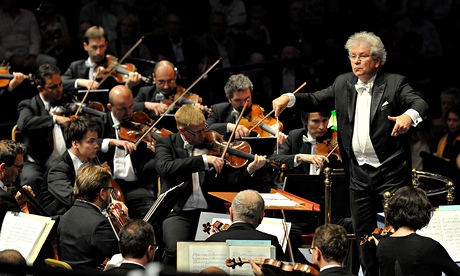
One of the many glories of the BBC Proms is the opportunity they offer to compare and contrast works by a single composer played by very different ensembles. And this doesn't apply purely to those enjoying special focus this year – Strauss, Walton, Maxwell Davies and Birtwistle, for instance – but to those we think we probably know too well, even Brahms and Beethoven.
Take last week. The Czech Philharmonic and Jiri Belohlávek breezed into town with a reading of Beethoven's seventh symphony that took Wagner's description of it as the "apotheosis of the dance" to extremes (Prom 50). It bounced and fizzed – a perfect showcase for the Phil's brilliantly refreshing sound world; the strings sleek and glossy, woodwind round and plump and brass edgy and exciting.
Belohlávek took the relentless tread of the second-movement allegretto and turned it into a brisk trot around the park, pushing the music ever onward, urging the engine of the orchestra – the rich and sonorous double basses perched in a row behind and above the rest of the players – to drive the insistent rhythmic motif that runs through every movement. Belohlávek had his players whirling through the giddying presto before ratcheting up the tension for an exciting dash through the cataclysmic finale. Joyous, life-affirming stuff.
Two nights later, in the Missa solemnis, John Eliot Gardiner and his Monteverdi Choir gave us an altogether different picture of Beethoven; no sleek string sounds here but the grainy, vibrato-free, "authentic" sound of his Orchestre Révolutionnaire et Romantique (Prom 54). This was Beethoven even further on the edge than in the crazed finale of the Seventh; Beethoven the radical, the revolutionary.
Interviewed before the concert, Gardiner said performing the work was like scaling Everest, and even though he and the choir had performed it 30 times in their 50-year history he still found it one of the most challenging pieces to conduct. But when you're John Eliot Gardiner you do not take the easy route up the mountain; tackling the brutal north face makes reaching the summit an even greater glory.
The calm foothills of the Kyrie were undercut with wonderfully brash brass and woodwind before the hard climb of the Gloria set off at an alarming pace and maintained a wild-eyed intensity right up to its crazy fugue, where Beethoven seems to go off the scale, pushing the singers to the limits of their range. A welcome moment of rest came when the choir's 10 tenors reached the refuge of the Et incarnatus est of the Credo, but that calm (only slightly marred by some pretty wonky tuning in the brass) was all too brief. The fiendish Et exspecto resurrectionem was conquered with ease by this most stylish of choirs, maintaining an admirable consistency of tone and balance even when Beethoven was making his most unreasonable demands on their voices.
He is as unfair to the chorus as he is generous to the soloists, giving them his most passionately creative vocal writing, wonderfully realised by soprano Lucy Crowe, mezzo Jennifer Johnston, tenor Michael Spyres and bass Matthew Rose. Throughout, the band amazed in all its raw-edged immediacy; a million miles from the suave, silky Czechs but no less exciting for that. It's hard to imagine the piece could be better performed.
And so to Brahms. This year, the Proms are examining all four symphonies, and the promise of the Budapest Festival Orchestra bringing the third and fourth (Prom 53) made their concert one of the hot ticket events of the season. (The Cleveland Orchestra's appearance with the first and second symphonies in a week's time will no doubt be similarly popular. Another chance to compare and contrast.)
Thirty years ago, Iván Fischer founded an orchestra that is today considered to be one of the 10 best in the world, an opinion shared, it would seem, by the 6,000 people crammed into the Albert Hall, eager to hear that particularly plush Hungarian sound which, allied to extraordinary attention to detail by Fischer, makes the entire string section behave like a vast quartet, each line delineated, every part unified. Like Belohlávek, Fischer ranges his double basses behind and above the other players, letting their driving insistence bloom instead of being lost behind the cellos and violas. Why don't London orchestras do this?
The autumnal third symphony burbled urbanely until we came to the third movement, where Fischer took the poco allegretto marking quite literally, giving it real momentum but also a cool detachment that robbed it of much of its charm. His insistence on rhythmic precision was more successful in the final allegro, which caught fire in dazzling fashion and underlined that this symphony is no sylvan idyll but, like the fourth, full of foreboding.
There was some foreboding for Fischer too, as apparently he felt unwell at the beginning of the interval but, after a delay, was able to continue. Thank goodness: this was a revelatory reading of the fourth symphony, the first violins kissing the opening theme with an almost erotic charge. Beautiful phrasing enhanced the joyous allegro giocoso, and the closing passacaglia will linger long in the memory.
And we had a real treat for an encore. Fischer announced the orchestra would perform Brahms's Abendständchen, his Evening Serenade, and, quickly forming themselves into voice parts, they sang us a delicate and refined farewell. They are not the Monteverdi Choir but their performance was testament to Hungarian musical training, where singing comes before all else. We look forward to hearing the LSO do the same…
• The Proms continue until 13 September. Details: Proms 2014

